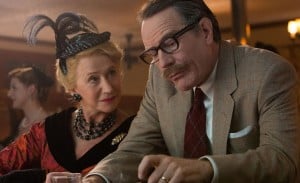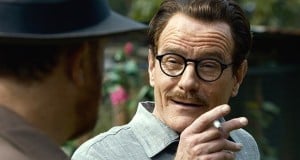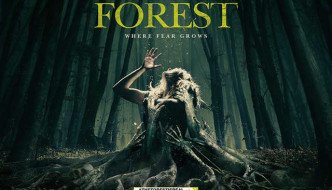Review: Jay Roach’s Trumbo
February 10, 2016

Unfortunately, Dalton Trumbo’s life and work will always be overshadowed by the witch hunt which blighted it. As the most prominent name to be blacklisted by the film industry for his refusal to testify before the House Un-American Activities Committee, Trumbo became a cause celebre on either side of the ideological divide: a potent example of the ‘enemy within’ to the McCarthyite ‘red hunters’, and a martyr to the Committee for the First Amendment which sprang up in opposition to HUAC’s assault on ‘communist infiltration’ of Hollywood.
Trumbo’s life was detailed in a lively if over-affectionate 2007 documentary, and this dramatic take on his travails suffers from some of the same structural problems. We begin with a portrait of Trumbo (Bryan Cranston) as the consummate champagne socialist, a highly regarded screenwriter living with his family on a sprawling ranch – this disjuncture between Trumbo’s beliefs and his lifestyle are broached in exchanges between him and fellow screenwriter Arlen Hird (Louis C.K.). Upon Trumbo’s becoming a member of the blacklisted ‘Hollywood Ten’, the film takes a turn towards the Ed Wood (1994), with Trumbo and his fellow blacklisted writers hatching various ploys to circumvent the blacklist, with the help of schlock-peddling film producers the King Brothers (John Goodman and Stephen Root).
 The tone of Trumbo most closely resembles Benjamin Ross’s TV movie RKO 281 (1999), an entertaining but surface take on the story of Orson Welles’ battle with William Randolph Hearst over the making of Citizen Kane (1941). John McNamara’s screenplay is a broad-stroke piece which betrays his TV background; while it stays clear of outright hagiography, the script makes no apology for the esteem in which it holds its subject, willing to indulge some of the mythology surrounding it. The darker undercurrents of Trumbo’s family life are neglected in favour of historical pointers and period minutiae; McNamara never fails to afford his central character the benefit of the doubt, and lets Hollywood off the hook for its complicity in acceding to and enforcing the blacklist. Director Jay Roach made his name helming the early instalments of the ‘Austin Powers’ and ‘Meet the Parents’ franchises; unlike Adam McKay with The Big Short (2015), Roach does little to overhaul his visual palette for the demands of drama, and the end result teeters awkwardly between worthiness and levity.
The tone of Trumbo most closely resembles Benjamin Ross’s TV movie RKO 281 (1999), an entertaining but surface take on the story of Orson Welles’ battle with William Randolph Hearst over the making of Citizen Kane (1941). John McNamara’s screenplay is a broad-stroke piece which betrays his TV background; while it stays clear of outright hagiography, the script makes no apology for the esteem in which it holds its subject, willing to indulge some of the mythology surrounding it. The darker undercurrents of Trumbo’s family life are neglected in favour of historical pointers and period minutiae; McNamara never fails to afford his central character the benefit of the doubt, and lets Hollywood off the hook for its complicity in acceding to and enforcing the blacklist. Director Jay Roach made his name helming the early instalments of the ‘Austin Powers’ and ‘Meet the Parents’ franchises; unlike Adam McKay with The Big Short (2015), Roach does little to overhaul his visual palette for the demands of drama, and the end result teeters awkwardly between worthiness and levity.
What lifts Trumbo beyond a competently constructed TV movie is Cranston’s remarkable central performance, which signals his first major step out of the shadow of Walter White. Cranston dominates every scene and completely loses himself in Trumbo – it is telling that Cranston is the only person involved in Trumbo to receive Academy recognition. It is difficult to envisage Trumbo in different hands, and the film is carried on the back of his exuberant turn. Louis C.K. is impressive as Hird – the acclaimed comedian is quickly becoming a very dependable character actor; further evidence of which can be found in his recently self-released dramedy series Horace and Pete – and the always underrated Michael Stuhlbarg elevates his portrayal of Edward G. Robinson beyond lazy caricature.
Sadly, the same cannot be said for many of the supporting performances, a number of which play like strained impersonations: particularly guilty of this are Dean O’ Gorman as Kirk Douglas, David James Elliot as John Wayne and Christian Berkel as Otto Preminger. As infamous gossip columnist Hedda Hopper, Helen Mirren delivers another one of those performances in which she acts from the costume outwards, using her locutions to get her through. John Goodman is in fine scenery-chewing form as the foul-mouthed Frank King, a role not dissimilar from his barnstorming, if barmy, turns in Argo (2012) and Flight (2012); Goodman’s prescription for a weak script seems to be to crank up the volume. Diane Lane dutifully occupies the periphery as Cleo Trumbo; again we see an Oscar contender in which the women provide moral succour as the brave men go about their business.
 Like last year’s Oscar-winning Still Alice, Trumbo is an average film whose success hinges on its dynamic central performance, and Cranston proves himself capable of leavening pedestrian fare by sheer force of his screen presence. There are shamefully few films about this dark chapter in Hollywood’s history, which makes Trumbo‘s lack of audacity all the more disappointing. For a film about a radical, Trumbo is dishearteningly mannered and reverential. What we have is a somewhat toothless portrait of a politically fraught period which is content to wallow in nostalgia and deal in well-worn dramatic tropes. It is a shame that McNamara and Roach could not provide Cranston with the vehicle he deserved.
Like last year’s Oscar-winning Still Alice, Trumbo is an average film whose success hinges on its dynamic central performance, and Cranston proves himself capable of leavening pedestrian fare by sheer force of his screen presence. There are shamefully few films about this dark chapter in Hollywood’s history, which makes Trumbo‘s lack of audacity all the more disappointing. For a film about a radical, Trumbo is dishearteningly mannered and reverential. What we have is a somewhat toothless portrait of a politically fraught period which is content to wallow in nostalgia and deal in well-worn dramatic tropes. It is a shame that McNamara and Roach could not provide Cranston with the vehicle he deserved.




Comments